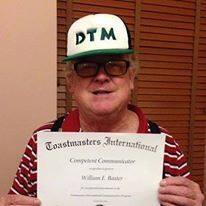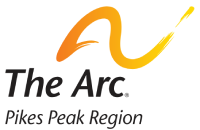 The Arc Pikes Peak Region was recently honored to publish Self Advocate Bill Baxter’s blog, “Realities of Being a Self Advocate: Part I.” We are pleased to continue this series in part 2, below. To learn more about or get involved with The Arc Pikes Peak Region’s group of self advocates, Include USA, click here.
The Arc Pikes Peak Region was recently honored to publish Self Advocate Bill Baxter’s blog, “Realities of Being a Self Advocate: Part I.” We are pleased to continue this series in part 2, below. To learn more about or get involved with The Arc Pikes Peak Region’s group of self advocates, Include USA, click here.
People with disabilities make up the number one minority group in the United States of America, and they often deal with prejudice, ignorance and hatred. This is something that I pretty much have had to deal with my entire life, especially when I was going through grade school during my youth. Despite being born a forceps baby, and with Tourette Syndrome, and being “different,” I was mainstreamed in society and regular educational and social settings most of the time, even though I did have some “Special Education” during my second and third grade years, and then later on during my tenth and eleventh grade years. As a youngster in grammar school, one of my mainstream leisure activities was developing some musical abilities.
Right after my fourth grade year, I started to learn how to play the accordion, and a year after that, the alto saxophone. I played the alto sax from 1967 through 1974. When I attended Trident Junior High School in Anaheim, California; from 1968 through 1970, there was an active Special Education Program for people with I/DD (Intellectual and Developmental Disabilities), but I was not part of that program, as I had been mainstreamed by my family since the fourth grade when I attended Francis Scott Key Elementary School, also in Anaheim. Many kids resented me because I was different, and they felt that I didn’t belong with them. In the Fall of 1969, I made the Trident Junior High Advanced Marching Band as a second string alto saxophone player. I sat next to the two tenor saxophone players who resented me being part of the saxophone section. I won’t mention their names. In fact, a lot of the band members made me feel unwelcome, not because I couldn’t play the sax (I could play it very well), but because I was different and they were down on that. The way that kind of prejudice and ignorance works, is that they (the tenor sax players and the other band members) would never own up to that.
The way prejudice works in a situation such as this that it didn’t matter whether I could play the saxophone on an advanced band level, but simply “I’m different and I don’t belong, and I have no business being in an advanced band. This is why self-advocacy is needed. Unfortunately, I let all this prejudice and hatred defeat me in a way that I started losing interest in playing the saxophone more and more until I finally gave it up altogether after high school. This was one of the biggest mistakes I have made throughout the course of my life. The best form of self-advocacy here would have been not only speaking up for myself, but continuing to practice and continuing to improve. If others see how well you improve and strive to get better, they could eventually come around.
Playing the alto saxophone was eventually replaced by singing. I first became interested in singing in a choral group when I was living in Fair Oaks, California (Sacramento Area). A year or so after moving from the Sacramento Area to the Washington D.C. area, I began attending Thomas S. Wootton High School, and became a member of the Wootton High School Concert Choir. I also played in the band at Wootton High. While my interest in playing the saxophone decreased, my interest in singing increased. My interest and abilities in singing have been on the increase to this day, even in my old age. I have been singing in Church Choirs since 1975. In the Early 1980’s I became interested in being a soloist and I have been doing that ever since. I took private voice training, mostly from an opera singer throughout most of the 1980’s. I did encounter prejudice many times on this journey, but this time I didn’t let it defeat me. I kept trying all the harder, and speaking up for myself when necessary. This is what true self-advocacy is, but there are limits.
Sometimes being a self-advocate does not win popularity contests, especially when it comes to “exposing prejudice and ignorance.” This is another important function of a self-advocate. There are still people out there who feel I should not be performing solo in public, or even in a small group. This isn’t because I can’t sing well, because I can. A lot of people feel it isn’t “Fitting” for me sing solos or in small groups because of my disabilities. There are also some who draw the conclusion that when I sing in church, God isn’t being Glorified*, and that I am only trying to build myself up because I am developmentally disabled. This I encountered in Orange County during the last couple of years I lived there before moving to Colorado. As it turns out, many people have been inspired whenever I have sung solos in church or anywhere else in public, and so God HAS BEEN GLORIFIED*. One of the first things I was told when I first moved to Colorado Springs, Colorado; in the Summer of 2010, besides “Welcome to Colorado,” was that I was banned from a particular Praise singing group. It’s amazing how a person with I/DD can be banned from a singing group he didn’t sing in or even ask to join in the first place. It is especially amazing as this particular person who is developmentally disabled (myself) had sung in a chorale, and once in an opera back in the Mid 1980’s. He had also sung the National Anthem at Professional Sporting Events for several years. But, they made sure I knew I was banned from the very start. My response was, “Fine, but I am a professional singer, and can sing good or better than anyone in that group.” As I said, that didn’t win me any popularity contests. Exposing prejudice is one of the hardest functions a self-advocate needs to perform, and quite often, a self-advocate will make social mistakes. However, prejudice and ignorance need to be exposed. A self-advocate should not shy away from exposing prejudice, and if he makes a social mistake, he should learn from the mistake and try to correct it so he can become a more effective self-advocate.
This is one of the challenges for self-advocates in our society today: exposing and dealing with prejudice. We need public speakers who are self-advocates to speak out in the school districts against student bullies who harass and torment people other students and children with I/DD; especially if there are any children or teens with I/DD who have been mainstreamed. This kind of prejudice and harassment should not be allowed in our schools, and there should be harsh penalties for student bullies who harass and torment students with I/DD just because they are different, and the bullies feel “they don’t belong.” It is the harassment and bullying that does not belong in our schools. This is another reason we need self-advocates.
*The Arc Pikes Peak Region does not endorse/is not affiliated with any particular religion/faith.
Subscribe To Our Newsletter and SMS Reminders
The best way to ensure that you receive our newsletter, our event invitations, SMS reminders and other important information is to become a member of The Arc of the Pikes Peak Region.
The best way to ensure that you receive our newsletter, our event invitations, and other important information is to become a member of The Arc of the Pikes Peak Region.

